Implementing NDIS Module 2a: Your Essential Guide
Module 2a or Module 2 - sounds confusing, right? Which one do I need to be able to implement Behaviour Support Plans and restrictive practices to NDIS participants? Read this article now to learn what Module 2a is, who needs to be registered for Module 2a and some handy tips to be compliant and have a successful audit.
What is Module 2a?
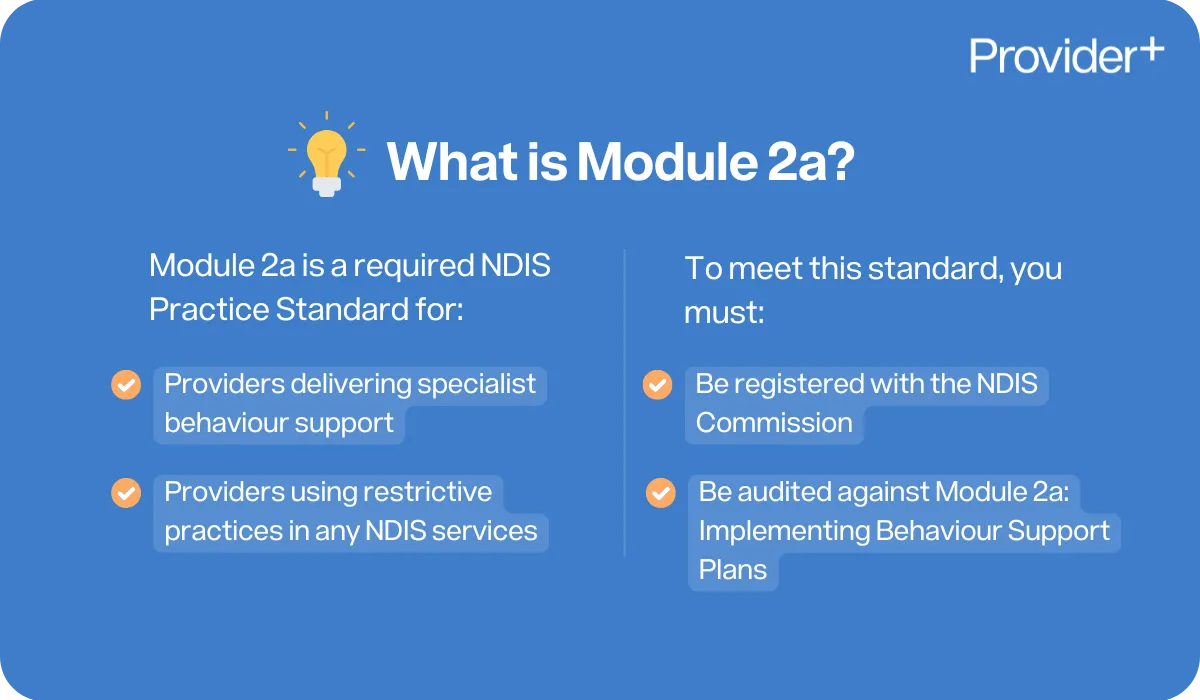
Module 2a is an NDIS Practice Standard that applies to NDIS providers who are registered to provide specialist behaviour support to NDIS participants. They also apply to providers using restrictive practices in the delivery of any NDIS supports and services.
Implementing Providers must be registered with the NDIS Commission for the type of support you are providing and be audited against Module 2A: Implementing Behaviour Support Plans.
What legislation do you need to know about?
Below are the legislation and rules that specialist behaviour support providers need to be aware of and be guided by for compliance and the staff implementation of Behaviour Support Plans and restrictive practices.
It is crucial to understand regulated restrictive practices and their compliance requirements under the NDIS framework to ensure proper authorisation and documentation.
Federal Register of Legislation - National Disability Insurance Scheme Act 2013
NDIS (Code of Conduct) Rules 2018
NDIS (Provider Registration and Practice Standards) Rules 2018
NDIS (Quality Indicators for NDIS Practice Standards) Guidelines 2018
NDIS (Restrictive Practices and Behaviour Support) Rules 2018
NDIS (Incident Management and Reportable Incidents) Rules 2018
Positive Behaviour Support Capability Framework
Who needs to be registered as specialist behaviour support providers?
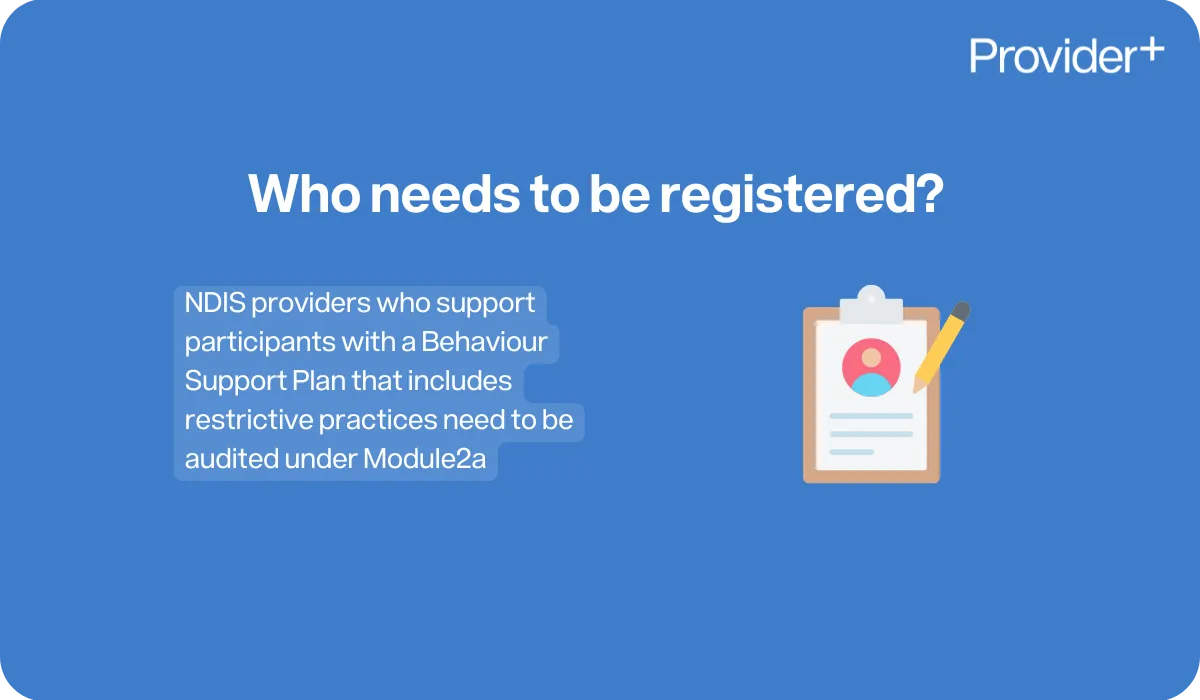
All NDIS providers who provide support to participants who have a Behaviour Support Plan that contains restrictive practices need to audited by an Approved Quality Auditor (AQA) under Module 2a.
A new requirement for NDIS registration – if or potential to implement restrictive practices, unregulated restrictive practices with a requirement for Behaviour Support Plan and ongoing RP’s. If you are a provider with 0107, 0115, 0125 and 0136 and are claiming the high intensity to support participants with Behaviour Support Plans, you must collaborate with an NDIS behaviour support practitioner to ensure compliance and effectiveness in developing and implementing these plans.
New changes to pricing updates
Starting from 1 October 2024, under certain circumstances, providers will be able to claim Intensive and Complex Behaviour Supports at the same price limit as High Intensity Supports.
Providers offering these supports can claim the higher price limit for registration groups 0107, 0115, 0125 and 0136. To be able to charge for this support, providers must:
- Provide behaviour support that are in line with the participant's plans.
- Be registered and assessed for Module 2A by 30 June 2025, or
- Apply for registration (new or amended) with a completed Module 2A audit by 30 June 2025.
For more information can be found on the Pricing arrangements page on the NDIA website.
What other compliance is linked to Module 2a and regulated restrictive practices?

Authorisation of behaviour support plans:
Authorisation of the restrictive practices that have been recommended by a Registered Behaviour Support Practitioner and is outlined in either an Interim or Comprehensive Behaviour Support Plan needs to have authorisation in place from the state or territory body where the participant lives. Each state or territory is different, and it is the Implementing Providers responsibility to know what the requirements are for authorising and consents.
In the context of chemical restraint, legal requirements and responsibilities include obtaining informed consent from a Responsible Person for Service Delivery Management (RPSDM). Medical practitioners must explore alternative strategies before prescribing chemical restraints, and the documentation and approval process must be thoroughly followed.
Information and guidance can be found in the Restrictive Practices Authorisation Frameworks – Australian States and Territories. Implementing Providers will need to show evidence of authorisation at audit.
Monthly Reporting:
All Implementing Providers will need to complete monthly reporting against the Behaviour Support Plan that has been uploaded, linked and accepted in the NDIS Commission Portal. Providers will need to report against the Behaviour Support Plan even if there has been NIL use for the month and this must be reporting on the 5th day of the following month. Providers will also need to report if there have been any changes to the restrictive practices.
Incident Reporting:
As an Implementing Provider you are required to complete a Reportable Incident for the use of any unauthorised use of restrictive practice and continue to report until the practice has been authorised or ceased using the practice under the recommendation of a Behaviour Support Practitioner. The goal is to eliminate restrictive practices through proper incident reporting and compliance.
Training in positive behaviour support:
As an Implementing Provider you will need to train your staff on Positive Behaviour Support, Restrictive Practices and Evidence Informed Practice, there are lots of training available or perhaps the Behaviour Support Practitioner could provide this training directly. This is general training to provide support workers the tools to be able to work with participants who have behaviours and will give them the necessary tools and knowledge if a practice falls under the Restrictive Practice Categories.
It is crucial to train staff on behaviour support strategies to ensure these strategies are effectively implemented and meet the individual’s needs.
In addition to this training, once engaged with a participants’ Behaviour Support Practitioner they will provide specific training on the behaviour of the participant, the Behaviour Support Plan (Interim and Comprehensive) and the restrictive practices that they have recommended and when and how to use these. They will also provide proactive strategies for staff to use routinely when supporting the participant to avoid the use or overuse of restrictive practices. You will need to provide evidence that training has been provided at audit.
Meetings:
Behaviour support specific meetings will be valuable not only for the participant but also for the support amongst the staff. You will need to keep minutes of these meetings as evidence for your audit. It is also important if available to have the Behaviour Support Practitioner attend some of the meetings. The involvement of a strong support network, including family members and direct support staff, can significantly enhance the effectiveness of these behaviour support meetings.
Support/Debriefing:
Offering support and debriefing and documenting these after an incident or the use of restrictive practice is highly recommended, and you will need to provide evidence of this at audit. Specific documentation should be used to record the debriefing for staff and also for the participant.
Understanding the person's behaviour during debriefing sessions is crucial for assessing and addressing the factors that influence their actions.
Collaboration:
Collaboration, at the end of the day means Behaviour Support Plans are more successful and have better outcomes when all parties who work or support the participants are involved from the commencement to gather information towards the functional assessment and have continue involvement with training, meetings and reviews. These connections are with the Behaviour Support Practitioner, Family, Service Providers, other Stakeholders, all connections need to be documented as evidence for your audit. Evidence can be minutes, emails, training registers and case notes.
A specialist behaviour support provider plays a crucial role in this collaborative process by assessing needs, creating plans, and ensuring effective training for staff to support individuals with disabilities.
Data:
Collecting and monitoring data will be important, you can use forms like ABC reports or specific report templates that have been designed by the Behaviour Support Practitioner. Monitoring and reviewing of data by the Implementing Provider and the Behaviour Support Practitioner should be documented and this information use to inform any reviews or changes. This information should be shared with the team that is supporting the participant, this can be shared at the team meeting with support staff or other forms of communication established. It’s important to note that consent to share information must be gained from the participant with the sharing of information.
Effective data collection and analysis play a crucial role in enhancing a person's quality of life through informed decision-making
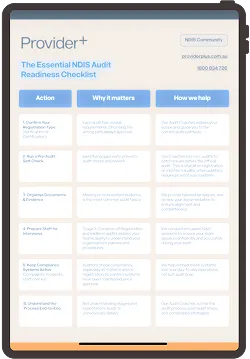
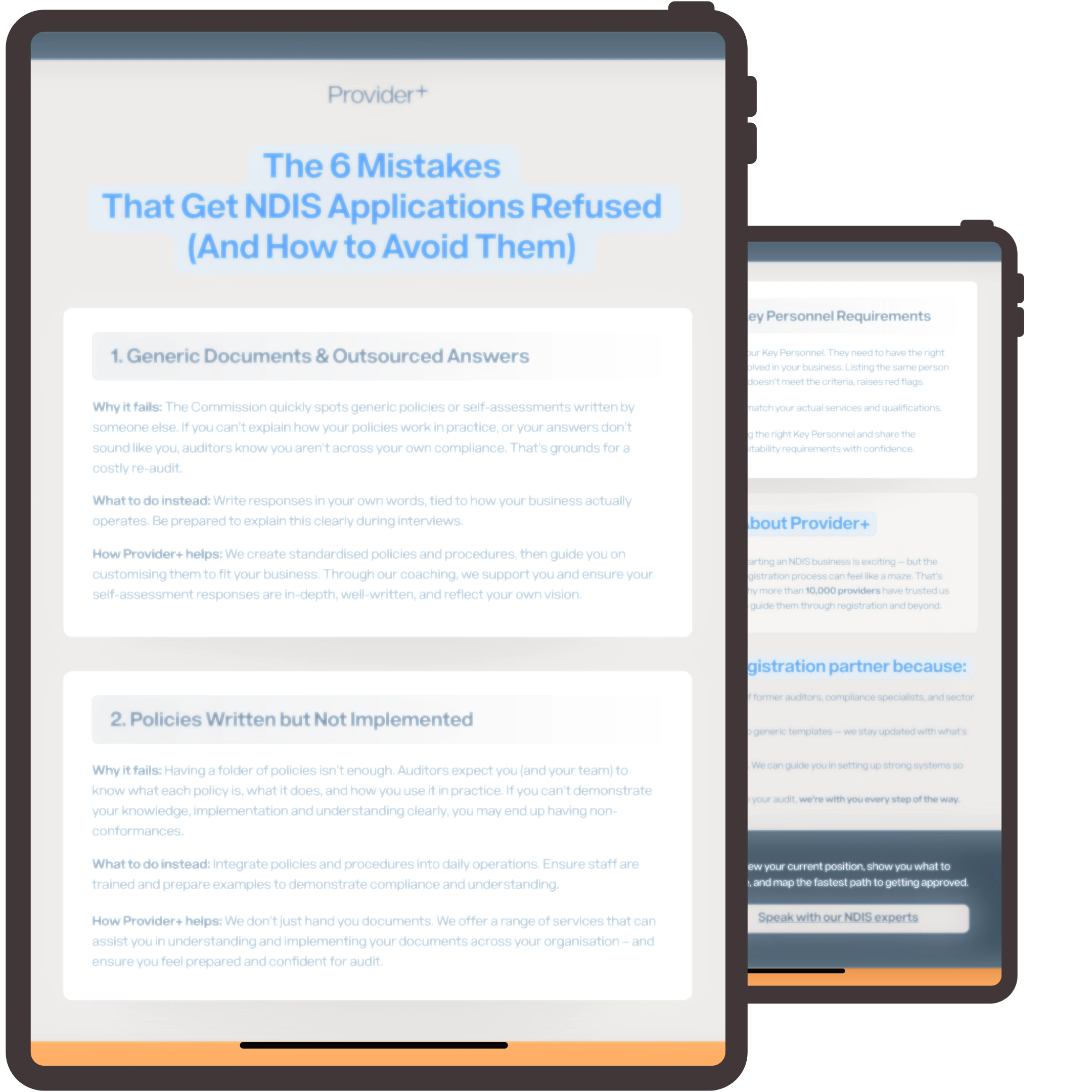
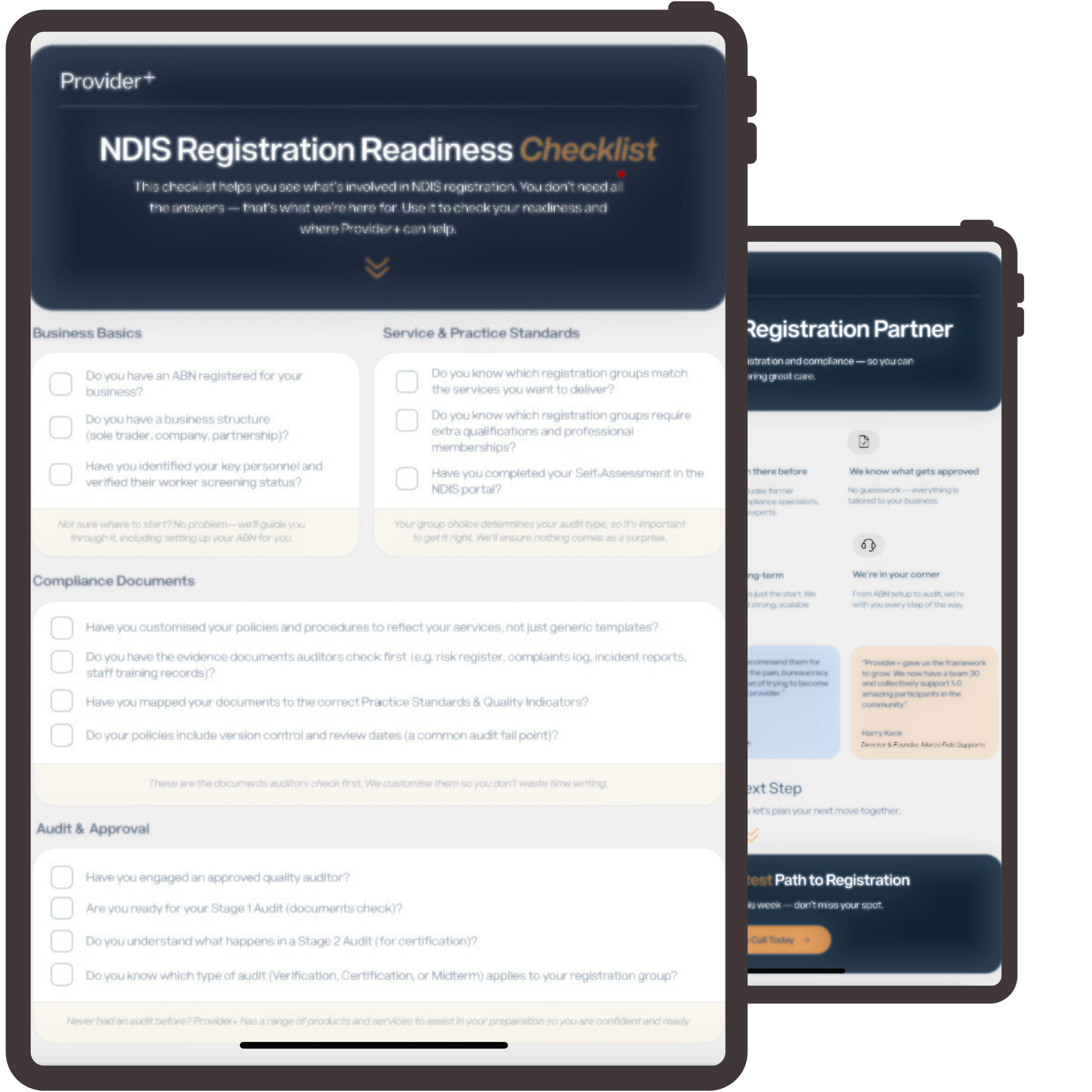

































FAQs
Here is our frequently asked questions.

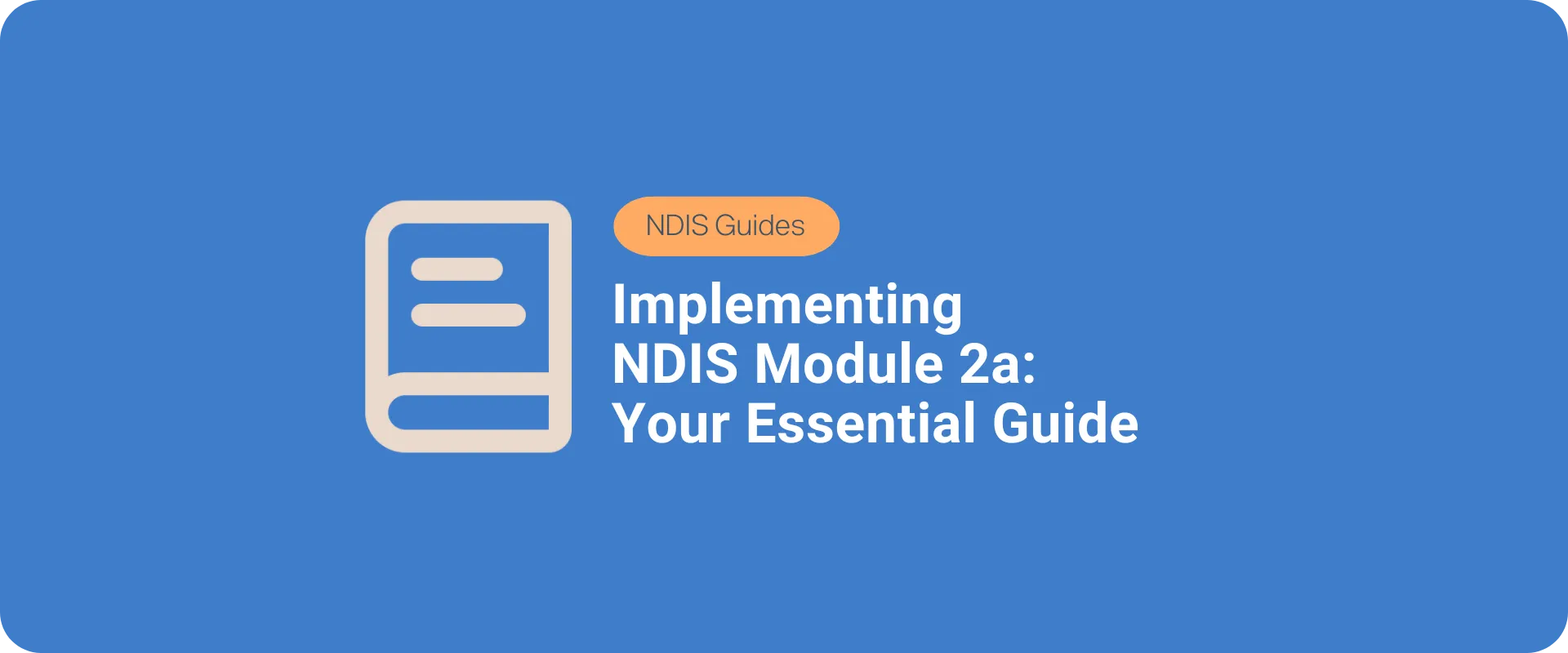
.webp)